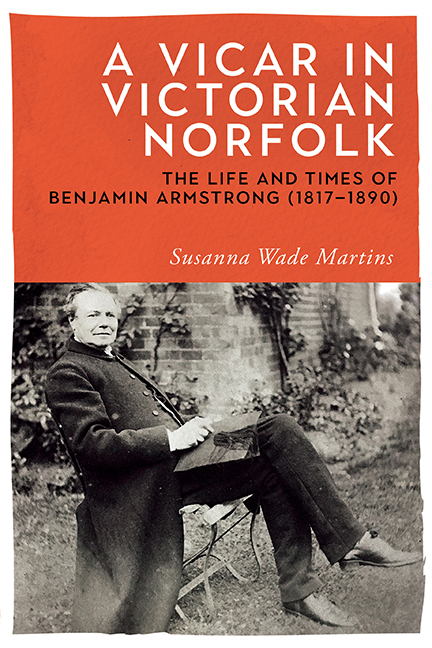Book contents
- Frontmatter
- Contents
- List of Illustrations
- Acknowledgements
- Foreword
- Author's Note
- Map
- Introduction
- I The Early Years
- 1 Early Life
- 2 The Move to Dereham
- II Public Life
- 3 The Norfolk Clergy
- 4 Church Life
- 5 The Building Legacy
- 6 Schools
- 7 Town Life
- III Family and Friends
- 8 Family Life
- 9 Friends
- IV Later Life
- 10 The Later Years
- 11 Armstrong: A Man of His Time
- Bibliography
- Timeline
- Index
11 - Armstrong: A Man of His Time
Published online by Cambridge University Press: 14 August 2020
- Frontmatter
- Contents
- List of Illustrations
- Acknowledgements
- Foreword
- Author's Note
- Map
- Introduction
- I The Early Years
- 1 Early Life
- 2 The Move to Dereham
- II Public Life
- 3 The Norfolk Clergy
- 4 Church Life
- 5 The Building Legacy
- 6 Schools
- 7 Town Life
- III Family and Friends
- 8 Family Life
- 9 Friends
- IV Later Life
- 10 The Later Years
- 11 Armstrong: A Man of His Time
- Bibliography
- Timeline
- Index
Summary
A biography can be read on two levels. First, it is a story of an individual life with its moments of joy, worry, emotional turmoil and tragedy, with which we empathise as fellow human beings, and certainly Armstrong’s diaries allow us to enter and share his experiences with him. Second, a biography can show how upbringing, education and circumstances have shaped the subject's role and influence on events around him. In this way it is more than simply the story of a life, fascinating though that may be; it is also a contribution to an understanding of the times in which that life was lived and its contribution to the changes and debates of the period. This final chapter attempts to look back over Armstrong’s life to discern how far he was an influence for change, both in the town and on the church he loved.
Armstrong's upbringing and early life were very much that of a young man born into a comfortably off family benefiting from the increasing commerce of the early nineteenth century. He took the conventional route through school and university and was as well equipped as any new clergyman of the time to take up a role as parson in his own parish. It was a role he fulfilled for forty-six years until his retirement in 1888.
The years which passed between Armstrong's ordination and his death in 1890 were a period of great change, both within the church and in society as a whole. When he was a child, the family retreat at Southall had been in the countryside, but with the arrival of the railway in 1856 it attracted a new sort of commuter and gradually lost its rural atmosphere. His first curacy was in the slums of Saffron Hill, but by the time of Armstrong's death the area was gradually improving. Changes during his time in Dereham included an increase in population by a third to over 5,600 as, attracted by the railway, more industries arrived. The town became a healthier place to live as a result of the work of local boards on which Armstrong sat. The provision of schooling, over which the church had almost a monopoly until 1870, was now a shared responsibility with the School Board (with which Armstrong was not associated).
- Type
- Chapter
- Information
- A Vicar in Victorian NorfolkThe Life and Times of Benjamin Armstrong (1817–1890), pp. 271 - 280Publisher: Boydell & BrewerPrint publication year: 2018



